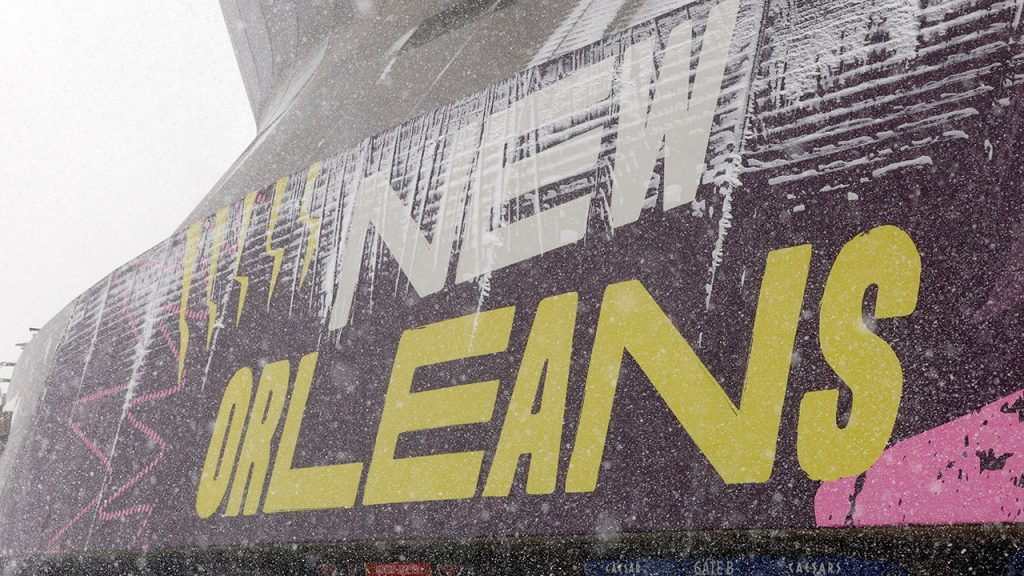The National Basketball Association (NBA) postponed the Wednesday, January 25th game between the New Orleans Pelicans and the Milwaukee Bucks due to an unprecedented winter storm that blanketed New Orleans in a thick layer of snow and ice. The unusual weather event, which dumped approximately a foot of snow on the city, created hazardous travel conditions and forced widespread closures of schools, businesses, and even the Louis Armstrong International Airport. New Orleans, accustomed to a warm climate, was ill-equipped to handle the heavy snowfall and resulting icy conditions. This travel disruption ultimately led the NBA to postpone the game, with a rescheduled date yet to be determined.
The Bucks had taken preemptive measures by arriving in New Orleans on Monday, a day earlier than their typical travel schedule for away games, hoping to avoid the impending storm. However, despite their efforts, the severity of the weather, including持续的 freezing temperatures and treacherous road conditions, rendered playing the game impossible. Major highways in the metropolitan area were shut down by authorities, and surface streets remained coated in a layer of ice, creating dangerous driving conditions. The pervasive closures and travel disruptions affecting the city also contributed to the NBA’s decision to postpone the game.
The postponement presents scheduling challenges for both teams, particularly the Pelicans. While the Bucks are scheduled to play the Miami Heat at home on Thursday and then embark on a West Coast road trip, leaving them without another home game until February 2nd, the Pelicans have games scheduled for both Friday and Saturday. This tight schedule makes it difficult to find an immediate opening to reschedule the postponed game. Furthermore, the Bucks’ next scheduled game against the Pelicans isn’t until April 9th, a late-season matchup in Milwaukee.
The contrasting performance of the two teams this season adds another layer to the postponement narrative. The Pelicans, currently holding a 12-32 record, are struggling near the bottom of the Western Conference standings. Conversely, the Bucks have enjoyed a more successful season, boasting a 24-17 record and occupying fourth place in the Eastern Conference. The postponement momentarily interrupts the Bucks’ attempt to maintain their playoff positioning in the highly competitive Eastern Conference. For the Pelicans, the game represents another contest in a challenging season.
The logistical difficulties surrounding the rescheduling process are compounded by the limited windows of opportunity within the already compressed NBA schedule. Finding a mutually agreeable date that doesn’t disrupt the existing flow of games for either team will require careful coordination by the league. The Pelicans’ back-to-back games on Friday and Saturday further complicate the matter, restricting the immediate availability of the team for a rescheduled match. The extended time between the originally scheduled game and the Bucks’ next scheduled matchup with the Pelicans in April also suggests that the postponed game will likely be slotted in much earlier, potentially requiring creative scheduling adjustments.
The unusual weather event in New Orleans underscores the unexpected challenges that can arise during a professional sports season. While teams and leagues meticulously plan their schedules and travel arrangements, unforeseen circumstances, such as extreme weather, can disrupt even the best-laid plans. The postponement of the Pelicans-Bucks game serves as a reminder of the unpredictable nature of live sports and the need for flexibility in adjusting to unforeseen circumstances. The incident also highlights the importance of prioritizing the safety of players, staff, and fans when making decisions about game scheduling. The NBA’s decision to postpone the game demonstrates a commitment to ensuring the well-being of all involved parties in the face of challenging and potentially hazardous conditions.

